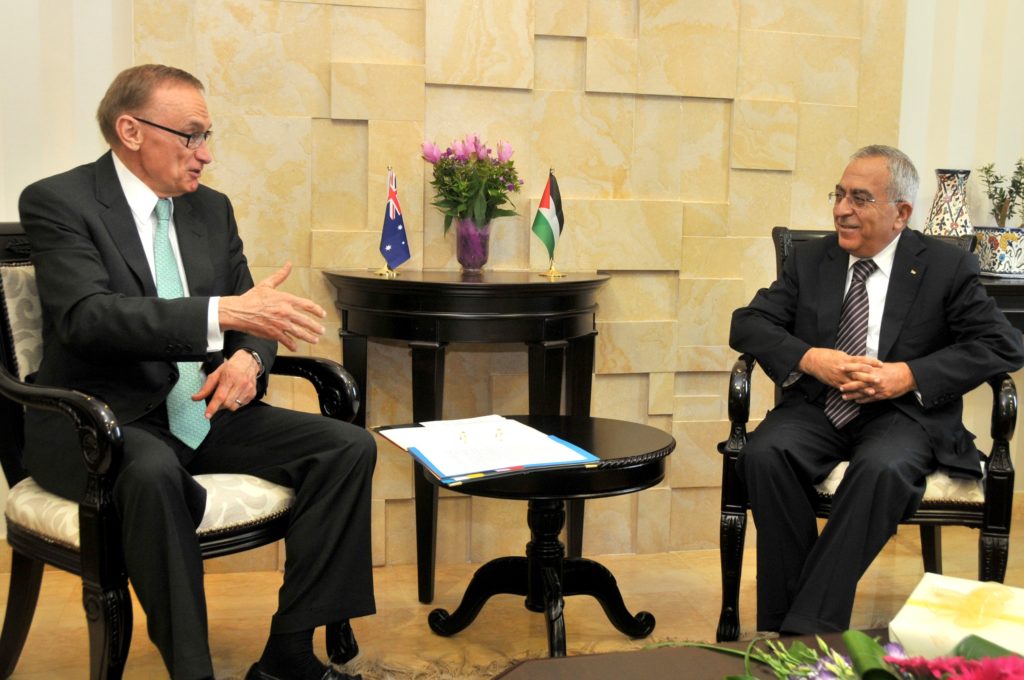IN THE MEDIA
Carr gives Middle East process a shot in the arm
September 6, 2012 | Colin Rubenstein

Australia won’t allow negotiations to be circumvented
Colin Rubenstein
Canberra Times – September 6, 2012
During his recent visit to Israel and the Palestinian Authority, Australia’s Foreign Minister Bob Carr showed true statesmanship by giving the moribund Middle East peace process a shot in the arm.
Stressing the need to ”bring the two parties together”, Carr met with Israeli and Palestinian leaders in Jerusalem and Ramallah, nudging the Palestinian Authority back towards the negotiating table and emphasising the need for a two-state solution for Israelis and Palestinians negotiated directly between themselves.
At a time when the PA is threatening to pursue unilateral statehood at the United Nations for the second year in a row, Carr’s encouragement for the Palestinians to return to peace talks sent a diplomatic yet firm message that Australia will not pander to efforts to circumvent negotiations.
It was therefore regrettable to read on these pages Australian Palestine Advocacy Network vice-president Robert Newton lobbying for Australia to abandon support for the resumption of Israeli-Palestinian negotiations without preconditions in favour of a course that will only prolong the conflict.
For the sake of true peace, it is advice that Australia should and likely will ignore. As a professed friend to both Israel and the Palestinians, Carr is in a unique position to reassure Palestinian advocates what he knows to be true – that Israel is a country that desires peace, but needs a partner to negotiate with.
For Israel, making peace with the Palestinians is clearly a strategic interest. The notion that Israel would prefer a perpetuation of the tense status quo over a genuine and secure peace with the Palestinians beggars belief. Even so, Israel is compelled to maintain its security control over the West Bank’s frontiers because the PA refuses to make the hard choices necessary to resolve the conflict.
This is not for lack of effort on Israel’s behalf. For the past 21 years starting with the 1991 Madrid Peace Conference, Israel’s unwavering commitment to direct negotiations with the Palestinians has led to a series of interim agreements, most prominently the 1993 Oslo Accords.
Among the benefits of these interim agreements for the Palestinians was the creation of the Palestinian National Authority, which has dramatically increased the amount of autonomy for Palestinians and reduced Palestinian exposure to the Israeli military. The PA currently controls 38 per cent of the territory of the West Bank, where more than 90 per cent of the Palestinians live and Israelis are banned from entering.
When the security situation has allowed, Israel has taken positive steps to facilitate Palestinian movement and trade. As of May, the Netanyahu government had removed over 75 per cent of the security checkpoints that had been in place since 2008. This month, Israel and the PA announced a new trade agreement that will improve the Palestinian economy.
Over the years, Israel has repeatedly shown readiness to accept territorial compromise with the Palestinians for peace. Israeli governments have withdrawn its military and dismantled settlements and outposts from parts of the West Bank either in co-ordination with the PA, or unilaterally.
In 2005, Israel unilaterally withdrew from Gaza, uprooting thousands of Israelis from their homes. It should be remembered that in return, terrorism from Gaza increased as thousands of rockets and mortars pounded Israeli towns with regularity.
In spite of all the setbacks – including the second intifada which took the lives of more than 1500 Israelis since the 1993 Oslo Accords – all major political parties in Israel today, and as opinion polls show about 75 percent of Israelis, support the creation of a Palestinian state in the West Bank and Gaza as part of a genuine peace agreement.
In his article, Newton questioned what such a two-state solution might look like. Israeli Prime Ministers Ehud Barak in 2000, and Ehud Olmert in 2008 made generous peace proposals to Palestinian negotiators that included offers to withdraw from the equivalent of 100 per cent of the West Bank. The parameters of these deals, including leaked maps, are widely accessible on the internet.
The Palestinian negotiators turned their backs on the offers and walked away from the negotiating table. Instead, they have chosen to unilaterally go to the UN in violation of existing agreements with Israel, in a futile effort to seek recognition of their ”state”. They are doing this because, sadly, the divided Palestinian leadership is unable or unwilling to agree on the compromises needed for peace.
The UN route is a way to preserve the illusion that they can gain statehood without making such compromises. As part of this strategy, since 2009, Palestinian leaders have used Israeli West Bank settlements as a pretext against negotiating. They have done so despite the fact that no new settlements have been constructed in over a decade, existing settlements cover less than 2 per cent of the West Bank, and that Palestinian negotiators had previously accepted in principle the concept of land swaps that would permit some settlements to remain.
he fate of the settlements remains, as mutually agreed, a final status issue to be resolved in negotiations. Next month, Tal Becker, a senior peace negotiator and advisor to former Foreign Minister Tzipi Livni under the Olmert government, will be visiting Australia. In meetings with lawmakers and community leaders, he will be conveying appreciation for Australia’s continued support for the renewal of direct negotiations between Israel and the Palestinians.
No doubt Carr will find in Becker a kindred spirit, who still believes in the need for a peace process that brings Israelis and Palestinians together to talk to one another, and not at or past one another, with the goal of creating an independent Palestinian state, alongside a secure Israel.
Dr Colin Rubenstein is executive director of the Australia/Israel & Jewish Affairs Council.
Tags: Australasia





